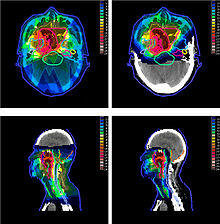Proton beam therapy is a form of targeted cancer treatment that has fewer debilitating side effects than traditional radiotherapy. The Mayo Clinic is a world-class center for cancer research and care in the Midwest, and now it will expand its holdings to include two new proton beam therapy centers, one in Rochester and another at its sister clinic in Phoenix. The type of advanced pencil beam scanning therapeutic equipment that the Mayo Clinic Proton Beam Therapy Center will use is very expensive (the two facilities will have a combined total cost of over $400M for 8 treatment rooms), and the $100 Million outright gift from philanthropist Richard O. Jacobson made earlier this year will go a considerable way toward advancing the project's progress. Intensity-modulated proton beam therapy is less damaging to the cancer patient's healthy cells (surrounding the cancerous growth) because:
Intensity-modulated proton beam therapy is less damaging to the cancer patient's healthy cells (surrounding the cancerous growth) because:
- Beam can be directed precisely at the tumor and
- Modulated intensity means beam will not pass through tumor.
[Images above right: Irradiation of nasopharyngeal carcinoma by photon therapy (left) and proton therapy (right), courtesy of Wikipedia]
This intense focus also allows for a higher dose of radiation to be used for a more powerful treatment. Traditional radiotherapy treatment for cancer uses photons and is commonly known as x-ray or gamma ray therapy. Regular proton beam therapy uses a larger beam than the pencil beam scanning. Intensity-modulated pencil beam proton treatment is especially valuable for use on children, who experience the most damage from conventional x-ray therapy, according to Dr. Robert Foote, chairman of Mayo's Radiation Oncology Department.
 The Rochester proton beam therapy center will be housed in the new Richard O. Jacobson Building, located downtown near Rochester Methodist Hospital. The facility will have 4 treatment rooms, each with an advanced proton beam particle accelerator; the first rooms are expected to be operational by late 2014 or early 2015. The facility will "enable Mayo to expand its research capabilities while providing a medical complex to perform life-saving techniques" according to the Mayo Clinic announcement of Jacobson's gift. [Interior drawing of new building courtesy of Mayo Clinic]
The Rochester proton beam therapy center will be housed in the new Richard O. Jacobson Building, located downtown near Rochester Methodist Hospital. The facility will have 4 treatment rooms, each with an advanced proton beam particle accelerator; the first rooms are expected to be operational by late 2014 or early 2015. The facility will "enable Mayo to expand its research capabilities while providing a medical complex to perform life-saving techniques" according to the Mayo Clinic announcement of Jacobson's gift. [Interior drawing of new building courtesy of Mayo Clinic]
If you would like the opportunity to meet and network with biomedical and oncological research scientists, lab managers, purchasers, and other life science equipment supply professionals, plan to attend the Biotechnology Calendar Rochester BioResearch Product Faire™ Event on July 27, 2011.


